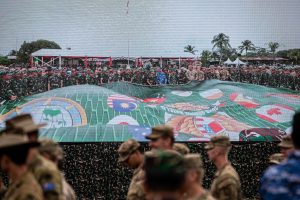Indonesia will today kick off its largest-ever annual joint military drills with the United States and a host of other countries, at time of rising tension in Southeast Asian waters.
The 2023 Super Garuda Shield exercise, which will take place until September 13 in Surabaya and Banyuwangi, East Java, will involve 1,900 Indonesian military personnel and 2,100 from the U.S., in addition to 1,000 more from Australia, Japan, and Singapore. The exercises will also for the first time include participants from France and the United Kingdom, while another 12 nations – Brunei, Brazil, Canada, Germany, India, Malaysia, Netherlands, New Zealand, Papua New Guinea, Philippines, Republic of Korea, and Timor-Leste – will send observers.
This year’s exercise is the most extensive iteration of the Garuda Shield exercise, which was established between the U.S. and Indonesian militaries in 2007, and forms a primary pillar of the two nations’ security relations. The “Super” was added to the title of the exercise last year, when it was expanded to include a slate of new participants, including Japan.
In a statement, the U.S. Embassy in Indonesia described the exercises as “a powerful demonstration of multilateral solidarity to safeguard a free and open Indo-Pacific region.”
“Super Garuda Shield 2023 builds on last year’s tremendous success,” Gen. Charles Flynn, commanding general of U.S. Army Pacific, was quoted as saying in the embassy statement. “This joint, multinational training exercise displays our collective commitment and like-minded unity, allowing for a stable, secure, and more peaceful, free and open Indo-Pacific.”
The drills will include academic exchanges and professional development workshops, a command-and-control simulation, an amphibious exercise, airborne operations, an airfield seizure exercise and a combined joint field training that will culminate with a live-fire event,
Indonesian military’s spokesperson Rear Adm. Julius Widjojono told BenarNews that the exercises aim to enhance the national army’s capabilities and strengthen regional security and cooperation.
“We can learn tactical methods of operation so that our soldiers become more professional,” he told the publication.
The drills will take place against a backdrop of increasing tension in maritime Asia, as U.S.-China tensions surge over Taiwan and frictions rise between China and rival claimants in the South China Sea. The past six months have seen a number of confrontations between Chinese and Philippine vessels in the Spratly Islands, as well as Chinese incursions into waters claimed by Vietnam. The latest of these came on August 28, when Chinese Coast Guard vessels reportedly fired high-pressure water cannons at at a Vietnamese fishing boat near the Paracel Islands, which are occupied by China but claimed by both countries.
Indonesia has been less directly affected by the maritime disputes, though it has experienced frictions with China in waters close to the Natuna Islands, a portion of which are bisected by Beijing’s expansive “nine-dash line” maritime claim.
The dashed line featured on the official map that China issued earlier this week, including a tenth dash to the east of Taiwan, to signify Beijing’s claim over the self-governing island. It also included Malaysian waters near Sabah and Sarawak, as well as disputed regions in India. The release of the map prompted a response from Malaysia’s foreign ministry, which said yesterday that it rejected China’s “unilateral claims” and added that the map was “not binding” under international maritime law.
While Indonesian and the U.S. share concerns about China’s maritime claims, which provide the basis for a degree of security cooperation in areas of mutual interest, their perceptions of China are not otherwise fully congruent. But as long as Beijing keeps up its alienating policy in the South China Sea, the aperture of cooperation between Jakarta and Washington (to say nothing of other partners in and beyond the region) will continue to expand.

































